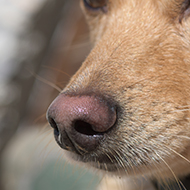
The dogs correctly identified the samples 92 per cent of the time.
Dogs can be trained to detect coronavirus infection from human skin swabs, according to new research.
In a three-part study, researchers at the University of Helsinki and Helsinki University Hospital found that trained scent dogs could accurately detect coronavirus in more than 90 per cent of samples.
Scientists say their findings, published in the journal BMG Global Health, provide valuable information on the use of scent dogs in pandemic control.
Anu Kantele, a professor of infectious diseases and chief physician at the University of Helsinki and Helsinki University Hospital, commented: "Scent dogs can provide an invaluable tool for limiting viral spread during a pandemic, serving, for example, at air- and seaports.
"Such a reliable, cheap approach to rapidly screen a vast number of samples or to identify passing virus carriers from a large crowd is of value, particularly when the testing capacity with traditional approaches is insufficient".
In the study, the team first trained the dogs to distinguish between skin swab samples from coronavirus patients and volunteers who tested negative. The dogs were then transferred from the training facility to Helsinki-Vantaa Airport.
Next, four of the trained dogs completed a validation test to prove their discriminatory ability. This experiment involved the team presenting the dogs with 420 samples over the course of a week.
The team found that the dogs could correctly identify the coronavirus samples 92 per cent of the time, only observing minor differences in accuracy. Virus variations were the most significant factor in the dogs incorrectly recognising the samples.
Phase three saw the dogs enter a real-life situation, screening passengers and staff at the airport. In this experiment, the dogs correctly identified 98.7 per cent of the negative samples.
The team explains that the low number of coronavirus samples helped them to assess the dogs’ performance with positive samples. They gave the dogs ‘work motivation samples’ at regular intervals to maintain their interest in the target odour.
'Work motivation samples' are samples pre-collected from PCR positive patients but not previously sniffed by dogs. From these, the dogs were able to accurately identify the virus 98.7 per cent of the time.
Anna Hielm-Björkman, a senior clinical instructor from the University of Helsinki, said: "Our research group will continue to study how scent dogs can best help our society. We hope that this newly published study will help to allocate funds for the development of this new ‘tool’.
"There are many other diseases where research could benefit from the excellent sense of smell that these dogs possess".



 The veterinary mental health charity Vetlife is inviting the veterinary community to join it for a sponsored cold-water dip.
The veterinary mental health charity Vetlife is inviting the veterinary community to join it for a sponsored cold-water dip.